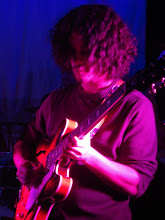I’ve already discussed what it means to improvise once before. The notion of navigation through an established network of possibilities, creating endless variations on a theme, be it a sequence of notes or of chord voicings, implies that nothing truly new can ever be created on the spot. When we practice we acquire and mold new musical pieces of lego, when we play we continually reconfigure them.
Ironically, my first discussion (The Upward Spiral) was centered around the notion of closed position and working extensively on the interesting possibilities that can arise from an extended study of one position. I was thinking about how I could spend years working on that idea. Well I was definitely right on that one because I’ve abandoned the concept in my practice for the time being. That’s ok though, maybe I’ll pick it up again in the future. At the time I was playing rhythmically complex and harmonically simple modal music, so these were the kinds of ideas floating around. Now I’m back in school and reexamining some more standard jazz and tonal contexts and all those ideas just don’t seem very relevant right now. Still, they’ve definitely had their influence on the way I think of and hear single line solo and melodic construction.
So for the last month and a half, I’ve been working on building small studies using chords that were new to me over standard tunes, all of which are posted here, most of which have accompanying videos. Now I’m faced with a new problem, how to integrate dozens of new voicings into contexts outside of the ones I originally used them. Every song has voicings that arose from the colors and mood of that song’s harmonic progression and melody. How can I generalize this information so I can better use it in any situation and make it a working part of my vocabulary?
The answer is old and obvious. Isolate the information and then transpose it all into all 12 keys, perhaps choosing a voicing every day or week and forcing myself to use it in a variety of different tunes and keys. But I’m feeling a little philosophical, and I’d like to dive into what exactly I think happens to our minds when we go through that process.
I sometimes hear people say how they have trouble feeling spontaneous when playing jazz. Everything seems to be prerecorded and regurgitated not in the organic fashion described above, but in a way that seems contrived and unemotional. They wonder how they can take their playing to the next level. I always ask the same question: How do you feel when you take a rock solo in a music idiom you’re more used to, say rock or blues? They usually say that this is the kind of freedom and feeling that they wish they could attain within the context of jazz music. So already half the battle is won because we’re aware of the feeling we wish we could capture with our new vocabulary.
But how did we all get to this place as young guitarists within the simpler context of rock, usually modal or blues in nature? Well, my belief is that we simply waited. We all had to spend months and months, if not years, learning the positions of the modes and developing our technique. Did our solos feel organic back then? Did we feel at ease and in control over the sounds we made? Probably not. But now, five, ten, twenty years later, depending on how old we are, our fingers somehow “know” how to navigate seamlessly through the notes of a major or minor scale, and any musical idea we can think of, our two hands cooperate effectively to execute. The truth is, we simply forget doing the work, and that distance allows us to approach the structure of the scale with a freshness and freedom that seems to help us express what is deep inside.
So how do we get to a place where we feel at home and emotional in a musical scenario that is intellectual and perhaps complex? We wait patiently. Practicing is not the answer. It is a step in the process. But not practicing is also a step. We have to take the time to thoroughly learn whatever material we are struggling with, but also take time to let things sink in, to forget them, and then upon remembering them later on, to use them in a way which is more satisfying.
In other words: improvising is an illusion. Nothing we do is truly improvised. Only the passage of time and the chemistry of our consciousness allows us the feeling of spontaneity. That’s ok. It’s the feeling we’re after, not some abstract notion of absolute and distilled invention. Especially as the tempo we play at goes up, our ability to forge new patterns within preexisting patterns continually diminishes, but nonetheless we are left with the feeling that we are doing something new and exciting.
When I see Am7 written on a page, there are probably 10 chords that I do 95% of the time. But rearranging and combining those 10 things, as well as leading into and out of them in different ways, results in an infinite number of possibilities. I move to these chords and shapes by carefully forged instincts created through diligent practice. Once again, the excitement and meaning I experience when playing comes from not remembering the process of creating those very reflexes.
To sum up, jazz, much like composition, is the very experience of maturing itself.
Subscribe to:
Post Comments (Atom)

No comments:
Post a Comment